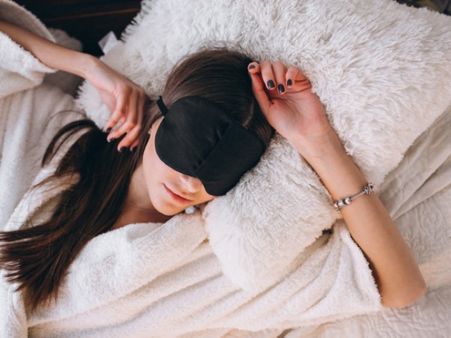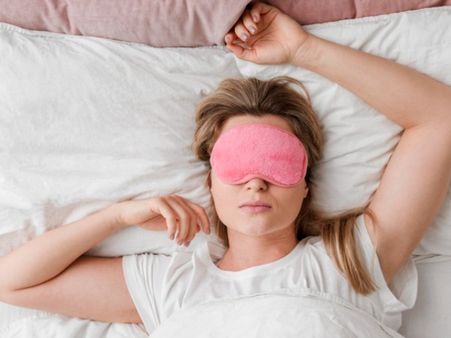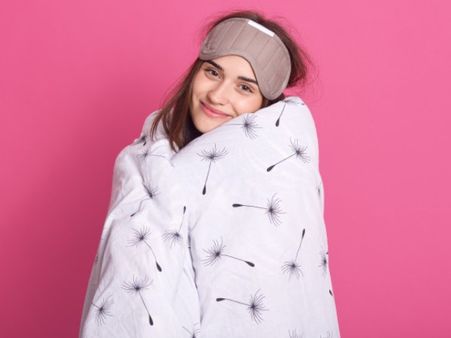Just In
- 6 hrs ago

- 6 hrs ago

- 10 hrs ago

- 16 hrs ago

Don't Miss
- Finance
 FREE, FREE, FREE! 3:1 Bonus: Pharma Stock Hits Back-To-Back Upper Circuits; 500 Shares To Earn Rs 1,69,500
FREE, FREE, FREE! 3:1 Bonus: Pharma Stock Hits Back-To-Back Upper Circuits; 500 Shares To Earn Rs 1,69,500 - Sports
 Manchester City vs Chelsea LIVE Streaming: Where to Watch FA Cup Semi-Final in India, UK, USA and Other Countries
Manchester City vs Chelsea LIVE Streaming: Where to Watch FA Cup Semi-Final in India, UK, USA and Other Countries - Movies
 Pukaar Dil Se Dil Tak Promo: Sayli Salunkhe Impresses In First Video Of Sony TV Show, Details About Her Role
Pukaar Dil Se Dil Tak Promo: Sayli Salunkhe Impresses In First Video Of Sony TV Show, Details About Her Role - News
 Chinese President Xi Jinping Orders Biggest Military Reorganisation Since 2015
Chinese President Xi Jinping Orders Biggest Military Reorganisation Since 2015 - Education
 Exam Pressure Does Not Exist; Studying Punctually is Crucial; Says Aditi, the PSEB 2024 Topper
Exam Pressure Does Not Exist; Studying Punctually is Crucial; Says Aditi, the PSEB 2024 Topper - Automobiles
 Suzuki Swift Hatchback Scores 4 Star Safety Rating At JNCAP – ADAS, New Engine & More
Suzuki Swift Hatchback Scores 4 Star Safety Rating At JNCAP – ADAS, New Engine & More - Technology
 Dell Introduces AI-Powered Laptops and Mobile Workstations for Enterprises in India
Dell Introduces AI-Powered Laptops and Mobile Workstations for Enterprises in India - Travel
 Journey From Delhi To Ooty: Top Transport Options And Attractions
Journey From Delhi To Ooty: Top Transport Options And Attractions
Can Sleep Masks Help You Sleep Better?
Sleep is critical for our health; it is no unknown fact. The quality of your sleep directly affects your mental and physical health and the quality of your waking life, including your productivity, emotional balance, heart health, weight and many more.
While the sleep requirement of one individual differs from the other, health experts and studies point out that it is critical for an adult to get 6 to 9 hours of sleep every night, to avoid the onset of various health problems [1].

Some of you are born with the undeniable gift of falling asleep anywhere and everywhere, but that is not the case for everyone. The surge in high-tech sleep gadgets on the market is statement enough to understand the lack of sleep, we as a society is suffering from.
From sleep blankets, yoga poses to sleep-inducing teas, the options you have are plenty but how about a piece of cloth? What if we told you that a piece of fabric covering your eyes can help improve sleep? Yes, we are talking about sleep masks, the simple solution to get some uninterrupted sleep.

Benefits Of Using A Sleep Mask
According to doctors and sleep specialists (somnologists), using a sleep mask can have the following benefits:
1. Improves sleep quality: Studies point out that, as human beings are diurnal (awake during the day and sleep at night), our brains naturally associate darkness with sleep and the brain tends to produce more melatonin (the hormone that controls our sleep and wake cycles) when they sense an absence of light - which you can get by wearing a sleep mask [2][3]. In addition to increased melatonin production, dark sleeping conditions have been linked to more REM sleep and less wakefulness [4].
2. Makes you fall asleep quicker: Wearing a sleep mask reduces the time spent lying awake in bed because complete darkness boosts your body's melatonin level which will send you to sleep much quicker than not wearing a sleep mask [5]. Also, a sleep mask encourages you to get back to sleep by blocking other stimuli (minimising distractions).
3. Improves skin health: Some sleep masks, made with silk or other extra-gentle fibres can help improve your sleep quality. That is, when you sleep without a mask, contact with your pillow can stretch the skin surrounding your eyes. In addition to this, as you are well-rested due to uninterrupted sleep, puffiness, or bags around your eyes in the morning can be easily avoided [6][7]. You can buy sleep masks made using specific materials, such as charcoal, to reduce puffiness and dryness around your eye sockets.
4. May help manage migraine: Light sensitivity is a common and unpleasant symptom associated with chronic migraines [8]. Sleep masks can help provide total darkness, which can help bring down the throbbing pain. Some sleep masks can even provide cooling or heating features specifically designed to ease migraine pain [9]. You can also freeze or refrigerate the sleep masks and use them when the migraine hits.


...
5. May manage depression: Although this claim requires further studies, a study indicated that getting some sleep in complete darkness can help reduce depression [10]. The participants showed reduced symptoms of depression.
6. Relaxes your mind and body: According to studies, deep touch pressure stimulation promotes the release of serotonin, a chemical that regulates sleep [11]. Deep pressure stimulation (DPS) is firm but gentle squeezing, hugs, or holding that relaxes the nervous system, so when you are wearing an eye mask, the gentle pressure may help you feel more relaxed and reduce feelings of anxiety [12][13].
7. May help treat dry eyes: Overnight, your eyes can be exposed to dry air, dust, and other irritants that can cause dry eyes in the morning, especially for individuals with nocturnal lagophthalmos, a condition that prevents one from completely closing the eyes. This can be avoided by wearing a sleep mask to bed [14].

Now that you are aware of the benefits of using a sleep mask, let us guide you on buying the right sleep mask for you.

How To Choose The Right Sleep Mask?
Sleep masks can help promote better sleep, but it is important that you choose on that is right for you. When choosing a sleep mask, look out for shape, size, material, and even the weight [15]. The sleep mask must be comfortable, not too tight, or itchy, or else it just fails the purpose.
- Size: You want to make sure your mask sits comfortably on your face but is still tight to block out the light. Buy a sleeping mask with adjustable strap for better comfort.
- Material: Cotton sleep masks provide a soft feel, silk masks are also extremely comfortable (but a bit pricey), or you can combination masks, which has a silk exterior and polyester filling. You can also try foam sleep masks.
- Weight: Most eye masks will list being lightweight; you can also try weighted eye masks which can provide a light pressure, thereby reducing stress.
- Colour: Some masks are made of light-coloured fabric which will not block the light fully, so if you want a sleep that is completely unbothered, buy one that has a blackout effect that lets in no light at all.
Try a mask made from 100 per cent natural, breathable materials like cotton or silk and wash it regularly with scent-free detergent and do not use any fabric softener.

Precautions While Using A Sleep Mask
•
Make
sure
the
sleep
mask
is
not
too
tight
as
it
can
cause
blurred
vision
in
the
morning.
•
Sleep
masks
may
cause
your
eyelashes
to
grow
crisscrossed
as
they
are
pressed
down
throughout
the
night.
Here are some extra pointers on how you can improve your sleep quality:
•
Leave
electronics
and
work-related
things
out
of
the
bedroom.
•
Maintain
a
dark
and
cool
atmosphere
in
your
bedroom.
•
Do
not
fluctuate
your
bedtime
and
wake
up
time.
•
Avoid
large
meals
for
at
least
three
hours
before
bed.
•
Avoid
caffeine
at
least
eight
hours
before
sleeping.
•
Do
not
consume
alcohol
right
before
sleeping.

On A Final Note…
It is important to find a sleep mask that works for you. Not only can sleep masks help improve your shut-eye time, but this piece of cloth can also help improve your mood, reduce stress and manage migraine pain - all thanks to the improved sleep facilitated by sleep masks.
-
 healthWorld Sleep Day 2024: Best Hacks For Sound Sleep That You Must Bookmark As They Will Ensure Overall Wellbeing
healthWorld Sleep Day 2024: Best Hacks For Sound Sleep That You Must Bookmark As They Will Ensure Overall Wellbeing -
 healthDoctor Explains How To Choose The Perfect Orthopedic Mattress To Ensure Spinal Health And Restful Sleep
healthDoctor Explains How To Choose The Perfect Orthopedic Mattress To Ensure Spinal Health And Restful Sleep -
 healthHere's How Often You Should Replace Your Mattress For The Best Quality Sleep
healthHere's How Often You Should Replace Your Mattress For The Best Quality Sleep -
 healthExclusive: Menopausal Symptoms Can Lead To Sleepless Nights For Women, 9 Expert-approved Remedies
healthExclusive: Menopausal Symptoms Can Lead To Sleepless Nights For Women, 9 Expert-approved Remedies -
 yoga spiritualitySwapna Shastra: What Does It Mean To Dream About Being Intimate With Someone?
yoga spiritualitySwapna Shastra: What Does It Mean To Dream About Being Intimate With Someone? -
 beautySkincare SOS: 4 Ways Your Midnight Phone Use Is Ruining Your Skin
beautySkincare SOS: 4 Ways Your Midnight Phone Use Is Ruining Your Skin -
 healthIs It Safe To Sleep With A Mouthguard On?
healthIs It Safe To Sleep With A Mouthguard On? -
 pregnancy parentingKid Have Trouble Sleeping? 3 Foods To Help Children Fall Asleep Faster
pregnancy parentingKid Have Trouble Sleeping? 3 Foods To Help Children Fall Asleep Faster -
 healthIs Your Disturbed Sleep Schedule Making You Gain Weight?
healthIs Your Disturbed Sleep Schedule Making You Gain Weight? -
 pregnancy parentingMom-to-Be? Discover Natural Ways to Get Rid of Pregnancy Sleep Problems
pregnancy parentingMom-to-Be? Discover Natural Ways to Get Rid of Pregnancy Sleep Problems -
 pregnancy parentingSafe Sleep Practices for Infants
pregnancy parentingSafe Sleep Practices for Infants -
 pregnancy parentingMyths Vs Facts: Your Baby Needs To Cry It Out To Learn To Fall Asleep On Their Own
pregnancy parentingMyths Vs Facts: Your Baby Needs To Cry It Out To Learn To Fall Asleep On Their Own


 Click it and Unblock the Notifications
Click it and Unblock the Notifications



